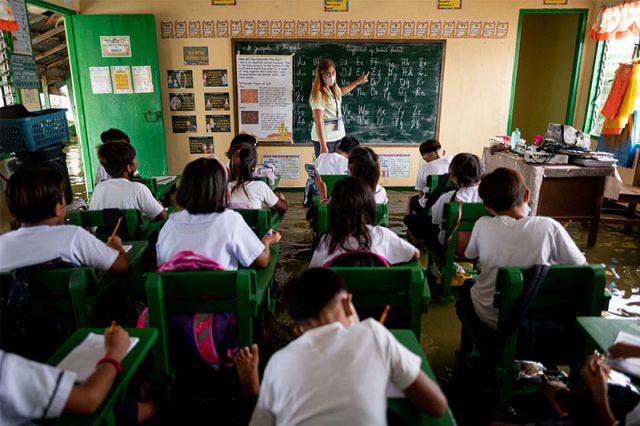
Mother Tongue may soon be removed as a subject in Grades 1 to 3 classes, a Department of Education official told the Senate.
“We intend to abandon the mother tongue as a subject, which is a separate learning area in the curriculum. And we will simply use the mother tongue, which is already the vernacular of the community, neighbors, and family, as part of the medium of instruction. No longer as a subject to be offered from Grade 1 to Grade 3,” Education Undersecretary Epimaco Densing III said.
“There is no need to teach it (mother tongue) to the children because this is already their everyday language in the school and community and family. So the assumption there is they understand it already before it is taught to them,” he added.
Dropping the subject, Densing said would free up 50 minutes of teaching the mother tongue to learners. The time will instead be “reallocated” to the national reading and math programs.
According to a World Bank report released in 2022, the Philippines scored the highest percentage of learning poverty in East Asia and the Pacific region. The learning poverty rate in the country is 91%, while the learning deprivation rate is 90%.
RELATED: Crisis in education? Pinoys fret over Philippines’ high learning poverty rate
Public support
DepEd’s plan to scrap the Mother Tongue as a subject was welcomed by many Filipinos who see the need to prioritize other subjects.
“Dapat ang tinuturo ay yung magagamit pagdating sa work or business. Ang tagalog matutunan mo yan kahit ‘di pag aralan. Dapat focus more on english subject kasi andyan ang needs ng companies. Tangalin na dapat yan mga walang kwentang subjects na yan ‘di namn nagagamit sa work,” a Facebook user wrote.
“Remove Filipino altogether. English brings in money. No offense, but our language has become trivial,” an online user said.
“Okay lang na wala nang subject na mother tongue.They speak that at home. Concentrate on the other subjects like english, mathematics science at araling panlipunan,” another said.
‘One step back from learning recovery’
While others welcomed DepEd’s decision, the Alliance of Concerned Teachers (ACT) expressed concern saying that the “step will make learning recovery more difficult and shows how the agency lacks real appreciation of the Mother Tongue’s role in learning.”
“Ang Mother Tongue subject ang unang hakbang sa literasiya ng mga bata. Ang wika na sinasalita at naiintindihan nila nang lubos ay dapat matutunan nilang isulat at basahin, dito naituturo ang komprehensyon sa mga mag-aaral. Mula rito, mas magiging madali na sa kanila ang bumasa at sumulat sa Filipino o sa Ingles,” said ACT Spokesperson Roel Mape.
Mape stressed the importance of literacy in the mother tongue for the medium of instruction to be effective.
“After two years of failed distance learning wherein many students did not effectively learn how to read and write and there is learning retrogression, it is all the more appropriate to capitalize on the benefits that Mother Tongue can contribute in swiftly bridging learning gaps and recovering learning loss in the primary grades,” Mape asserted.
Lack of resources
Mape also questioned the lack of budget to implement Mother Tongued-based Multilingual Education (MTB-MLE).
“Pagkatapos ng 10 taon mukhang kapos pa rin ang pag-unawa at pagpapahalaga ng DepEd sa Mother Tongue. Ito rin ba ang dahilan kung bakit napakapalpak ng DepEd sa pagpapatupad ng programang Mother Tongued-based Multilingual Education at hindi ito binibigyan ng sapat na pondo?” he asked.
Aside from budget concerns, Teachers’ Dignity Coalition chairperson Benjo Basas said the lack of training and publication are other problems in the enforcement of the MTB-MLE.
“Sa isang dekada po na na-experience natin iyong mga kakulangan nito, ito iyong dapat asikasuhin ng Department of Education at ng mga ahensiya, lalo na siyempre ng Kongreso, dahil maraming bagay po rito ay may kinalaman sa budget, training at mga publikasyon,” Basas said.
The DepEd also reportedly said that only 78,872 of the 305,099 teachers it had aimed to train for the use of the mother tongue as a medium of instruction were proficient in using it as a medium of instruction.
The learning resources also remain a problem as many languages in the country do not have an official dictionary and orthography to guide learners in spelling.
Komisyon ng Wika ng Filipino Chair Arthur Casonava said publishing an orthography and dictionary requires time, resources, and assistance from experts.
Basas, meanwhile, urged DepEd and the Senate to address the lapses in the Mother Tongue program’s implementation instead of terminating it.
“Ang mother tongue ay isang karapatan—isang karapatang pantao,” he noted.
“Naniniwala kami na ang pagkatuto ng mga bata ay nakabatay po sa sarili niyang wika na ginagamit niya sa pang araw-araw, na ginagamit niya sa pangunawa, at dapat pong gamitin sa earliest period ng kanyang pagaaral,” Basas said.









